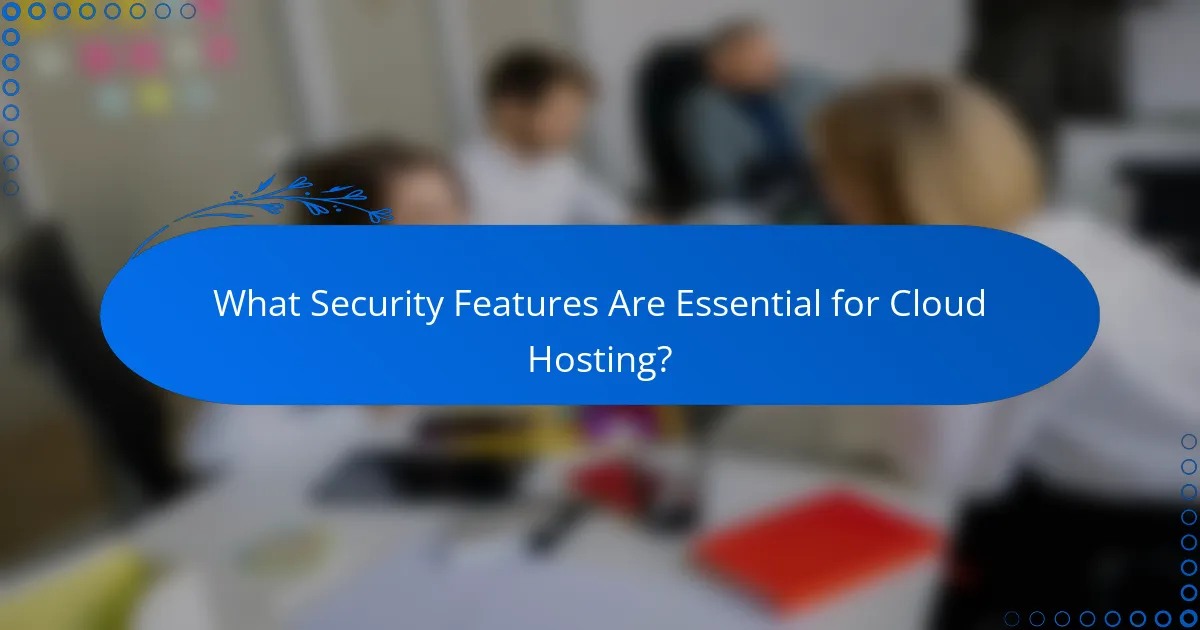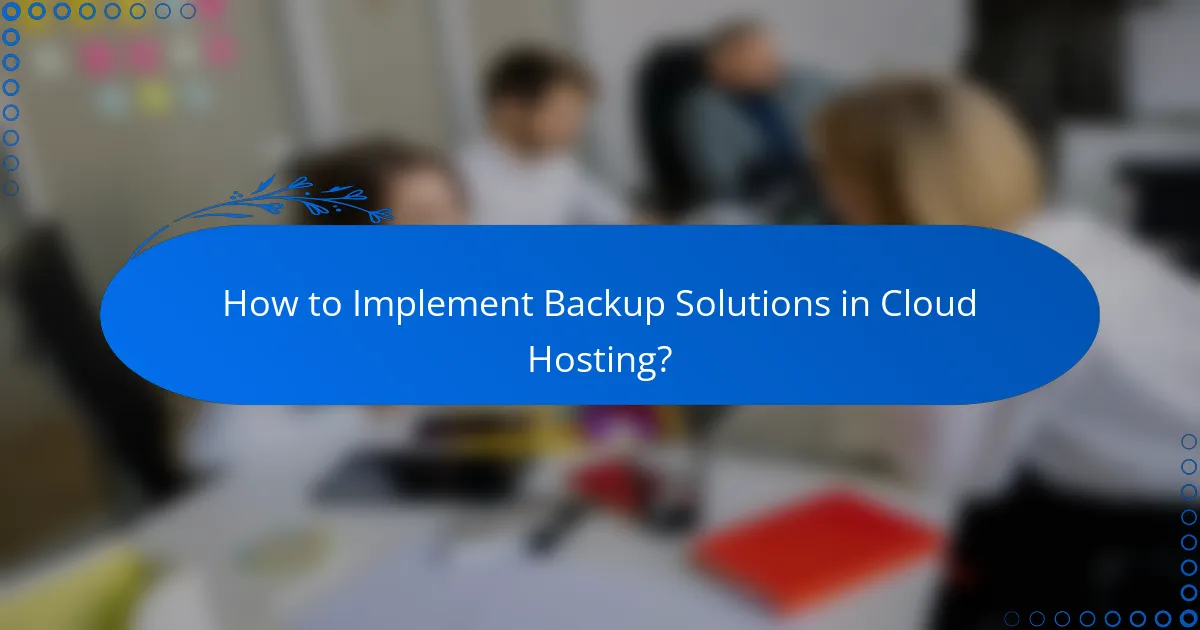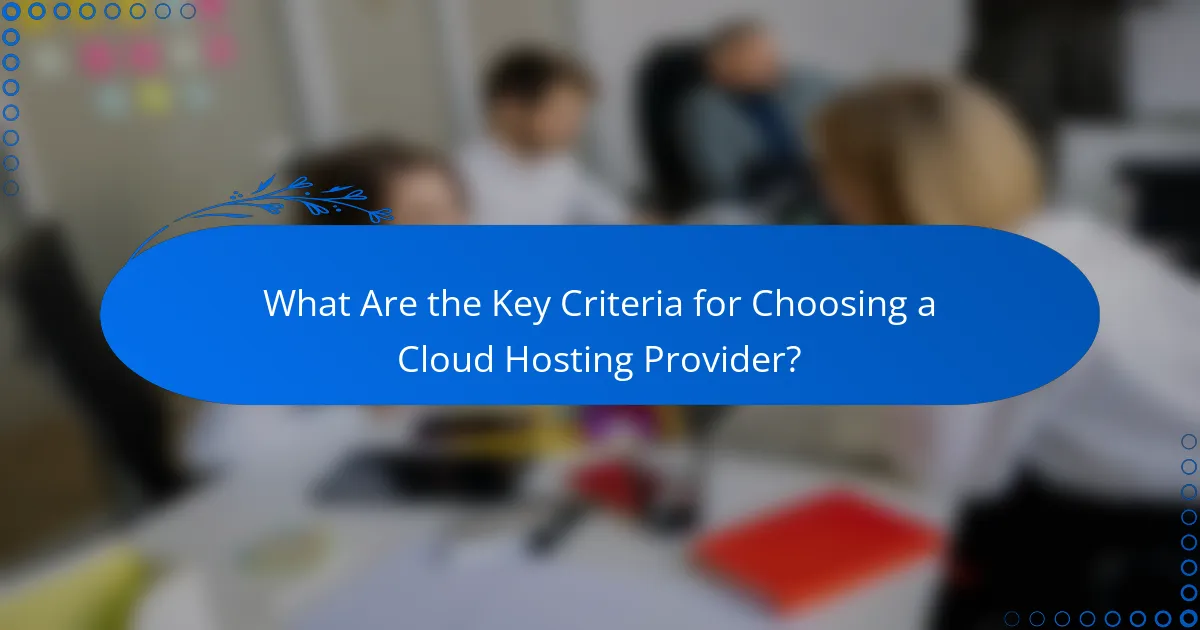Cloud hosting in Bulgaria provides essential scalability, security, and backup solutions tailored for diverse business needs. With options from global leaders and local providers, companies can enhance performance and ensure data integrity. Key considerations include evaluating security protocols, compliance standards, and customer support to make informed choices.

What Are the Best Cloud Hosting Solutions for Bulgaria?
Cloud hosting solutions in Bulgaria offer vital flexibility, reliability, and scalability for businesses of all sizes, from startups to large enterprises. The best options include global leaders like AWS and Google Cloud, alongside local providers, ensuring a wide range of services tailored to specific operational needs.
When choosing a cloud hosting provider, it’s crucial to evaluate performance metrics, security protocols, and customer support quality. Each solution has unique features that cater to different business requirements, making a thorough assessment essential for informed decision-making.
The demand for cloud services in Bulgaria is growing, with an annual growth rate of 20%, fueled by the need for efficient data management and operational agility. This trend highlights the importance of selecting a provider that aligns with your strategic business goals.
AWS Cloud Hosting
AWS Cloud Hosting emerges as a top choice for businesses seeking a robust infrastructure with unmatched scalability. It offers a comprehensive suite of services, including computing power, storage solutions, and advanced database management, suitable for various applications.
With AWS, users can dynamically adjust resources based on real-time demand, ensuring optimal performance during peak periods. This flexibility is crucial for businesses facing significant workload fluctuations, allowing them to maintain efficiency without overspending.
Moreover, AWS features advanced security measures like data encryption and granular access controls, essential for safeguarding sensitive information. This level of security is vital for compliance with regulations such as GDPR and for maintaining customer trust.
Google Cloud Platform
Google Cloud Platform (GCP) is renowned for its outstanding data analytics and machine learning capabilities, enabling businesses to leverage big data for actionable insights. GCP’s services are designed to promote innovation and enhance operational efficiency.
Built on the same infrastructure that powers Google’s services, GCP ensures high reliability and performance, making it an attractive option for companies striving to remain competitive in a fast-paced market. This reliability is underscored by GCP’s 99.95% uptime SLA, guaranteeing consistent service availability.
Additionally, GCP employs robust security measures, including identity and access management and real-time threat detection, crucial for maintaining data integrity. Businesses can trust GCP to protect their information while they focus on scaling operations.
Microsoft Azure
Microsoft Azure provides a comprehensive cloud platform that integrates seamlessly with existing Microsoft products, making it especially beneficial for organizations already using Microsoft software. This integration facilitates a smoother transition to cloud services.
Azure offers a diverse range of services, such as virtual machines, app services, and database solutions, allowing businesses to efficiently build and manage applications in the cloud. Its hybrid capabilities enable organizations to effectively combine on-premises and cloud resources, addressing varied operational needs.
Security is a top priority for Azure, featuring advanced threat protection and numerous compliance certifications, including ISO 27001 and HIPAA. This commitment to security ensures businesses can operate confidently, knowing their data meets industry standards.
Local Bulgarian Providers
Local Bulgarian cloud hosting providers offer tailored solutions that specifically meet the unique needs of businesses in the region. These providers often have a deeper understanding of local regulations and market dynamics compared to international counterparts.
Notable local providers like Host.bg, SuperHosting.BG, and ICN.Bg offer a range of services, including shared hosting, VPS, and dedicated servers. They typically provide personalized customer support and competitive pricing, particularly beneficial for small to medium-sized enterprises.
Choosing a local provider can enhance connectivity and reduce latency for Bulgarian businesses, leading to improved performance. Additionally, local support often means quicker response times and a better understanding of customer needs, fostering stronger business relationships.
Comparative Pricing
Pricing for cloud hosting solutions varies significantly among providers, influenced by features, performance metrics, and customer support levels. Understanding these pricing structures is crucial for making informed decisions that align with budget constraints.
For instance, AWS and GCP often use pay-as-you-go pricing models, which can be cost-effective for businesses with variable workloads, allowing them to pay only for the resources they use. In contrast, local providers may offer fixed pricing plans that simplify budgeting and financial forecasting.
When assessing costs, it’s important to consider not only the base price but also potential additional expenses, such as data transfer fees and support costs. Conducting a thorough pricing analysis will empower businesses to choose the most economical option that meets their specific needs.

How Does Scalability Work in Cloud Hosting?
Scalability in cloud hosting allows businesses to adjust resources dynamically based on real-time demand, which is vital for optimal performance during peak traffic. For example, a retail website may see a 300% surge in visitors during holiday sales, requiring immediate resource adjustments. This flexibility boosts user satisfaction and minimizes downtime, ensuring uninterrupted services. Understanding scalability is essential for organizations looking to optimize operational costs and enhance efficiency, as it enables precise resource allocation without the risk of over-provisioning.
Vertical Scaling
Vertical scaling, or “scaling up,” enhances an existing server’s capabilities by increasing its CPU, RAM, or storage. For instance, a business might upgrade its server from 16GB to 32GB of RAM to handle a sudden traffic spike, potentially boosting performance by up to 50%. This method is straightforward, requiring minimal configuration changes, making it appealing for businesses seeking quick solutions. However, vertical scaling is limited by a single server’s maximum capacity, which can restrict growth and necessitate careful planning for future scalability.
Horizontal Scaling
Horizontal scaling, or “scaling out,” involves adding servers to distribute the workload across multiple machines, significantly improving performance and reliability. For example, a web application running on five servers can accommodate five times the users of a single server setup, enhancing user experience and providing redundancy that bolsters fault tolerance. While horizontal scaling can be more complex due to the need for load balancing and coordination, it offers greater flexibility, allowing businesses to expand their infrastructure seamlessly as demand increases, overcoming the limitations of vertical scaling.

What Security Features Are Essential for Cloud Hosting?
Security features are essential for cloud hosting, safeguarding sensitive data and fostering user trust. Key components include data encryption, access control, and compliance with standards, with 93% of organizations identifying data security as a top priority. These features ensure data confidentiality, restrict access to authorized users, and comply with legal requirements, thereby bolstering customer confidence and business integrity.
Data encryption converts readable information into an unreadable format, protecting it from unauthorized access. For instance, AES (Advanced Encryption Standard) is widely used to encrypt data both at rest and in transit, with key sizes of 128, 192, or 256 bits offering varying security levels. Strong encryption protocols are crucial for defending sensitive information against breaches; studies indicate that organizations with robust encryption practices can lower the risk of data breaches by up to 80%.
Access control mechanisms determine who can view or utilize resources in the cloud. Role-based access control (RBAC) enables administrators to assign permissions based on user roles, ensuring that only authorized personnel can access specific data. This approach minimizes internal threats and enhances overall security, with organizations using RBAC reporting a 50% reduction in unauthorized access incidents.
Compliance standards, such as GDPR and HIPAA, outline how organizations must manage sensitive information. Adhering to these regulations not only protects data but also prevents legal penalties, which can soar to €20 million or 4% of annual global turnover under GDPR. Cloud providers often undergo audits to demonstrate compliance, offering clients reassurance about their data security and building trust in their services.
Data encryption is a fundamental security measure for cloud hosting, ensuring protection from unauthorized access. It involves converting data into a coded format that can only be deciphered with the correct key or password, a process vital for maintaining confidentiality, especially for sensitive information like financial records or personal data. Organizations that encrypt their data can significantly reduce the risk of breaches, as encrypted data is 10 times less likely to be compromised.
Common encryption methods include symmetric encryption, where the same key is used for both encryption and decryption, and asymmetric encryption, which employs a pair of keys. For example, SSL/TLS protocols encrypt data transmitted over the internet, shielding it from eavesdroppers, with SSL certificates being standard for secure online transactions. Implementing these methods is crucial for any organization handling sensitive data, as neglecting them can lead to severe financial and reputational damage.
The consequences of failing to use encryption can be dire, resulting in data breaches and loss of customer trust. Organizations may face legal repercussions if they inadequately protect sensitive information, with the average cost of a data breach reaching $4.35 million in 2023. Therefore, adopting robust encryption practices is not merely a technical requirement but a business necessity, especially in an era of increasingly sophisticated cyber threats.
Access control is critical in cloud hosting, defining who can access and manage data. It involves implementing policies and technologies to restrict access based on user roles and responsibilities, ensuring that sensitive information is available only to authorized users. This approach reduces the risk of data breaches, as organizations with effective access control measures can decrease insider threats by up to 70%.
Various access control models exist, including discretionary access control (DAC), mandatory access control (MAC), and role-based access control (RBAC). RBAC is particularly effective in cloud environments, allowing administrators to assign permissions based on user roles, which simplifies management and enhances security. Organizations that utilize RBAC report a 40% increase in operational efficiency due to streamlined access management.
Neglecting effective access control can lead to unauthorized access, data leaks, and compliance violations. Organizations must regularly review and update access permissions to adapt to changing roles and ensure ongoing security, with best practices recommending quarterly audits of access rights. This proactive approach is essential for maintaining a secure cloud environment, helping to identify and mitigate potential vulnerabilities before exploitation.
Compliance standards are regulations dictating how organizations should manage and protect sensitive data. In cloud hosting, these standards ensure data is handled according to legal and ethical guidelines, with non-compliance potentially resulting in fines exceeding $1 million. Examples include GDPR for personal data protection and HIPAA for healthcare information, both emphasizing the importance of data security and privacy.
Organizations must grasp the specific compliance requirements relevant to their industry and implement necessary measures to meet these standards. This often involves conducting regular audits, maintaining documentation, and ensuring all employees are trained on compliance protocols, with 60% of organizations reporting that employee training significantly enhances compliance outcomes. Non-compliance can lead to hefty fines and reputational damage, making compliance a critical aspect of data governance.
Moreover, cloud service providers often offer compliance certifications, helping clients demonstrate their commitment to data security. By choosing a compliant provider, organizations can mitigate risks and enhance their credibility with customers and regulators alike, as 75% of consumers prefer businesses that prioritize data protection. Compliance is not just a legal obligation but a competitive advantage in today’s data-driven landscape, influencing customer choice and loyalty.

How to Implement Backup Solutions in Cloud Hosting?
Implementing backup solutions in cloud hosting is crucial for maintaining data integrity and availability. Studies show that 60% of companies that lose their data shut down within six months. These solutions protect your data from unexpected failures or disasters, such as hardware malfunctions or cyberattacks, which can strike at any moment.
Cloud hosting providers typically offer various backup options, including automated and manual backups. With 70% of businesses choosing automated solutions for their efficiency, understanding these options enables companies to select the best fit for their operational needs and risk tolerance.
Regularly scheduled backups can drastically reduce data loss—research indicates that companies performing daily backups can recover 90% of lost data. Businesses should assess their data retention policies to determine the optimal frequency and type of backups, balancing cost with recovery speed.
In Bulgaria, businesses can utilize local cloud providers that adhere to EU regulations, ensuring strong data protection and privacy standards. This compliance is vital for maintaining customer trust and fulfilling legal obligations, especially in a market where 75% of consumers prioritize data security when selecting a service provider.
Automated Backups
Automated backups are pre-scheduled processes that create data copies without manual intervention, reducing the risk of human error by up to 80%. This consistency ensures that backups occur reliably, providing a safety net for critical business information.
For example, a cloud hosting service may allow users to schedule daily or weekly backups, which is especially beneficial for businesses handling large volumes of frequently updated data. This feature enhances operational efficiency, helping companies avoid potential data loss during peak activity periods.
Automated backups not only save time but also instill confidence, as 90% of businesses report increased assurance in their data security. This allows companies to concentrate on their core operations, knowing their data is securely backed up at regular intervals without extra effort.
Disaster Recovery Plans
A disaster recovery plan outlines procedures for restoring data and services after a catastrophic event. With 93% of companies experiencing significant data loss failing within five years, this plan is essential for minimizing downtime and ensuring business continuity amid unforeseen challenges.
For instance, a company might adopt a multi-region backup strategy, storing data in various geographic locations to safeguard against localized disasters like natural calamities or power outages. This approach can cut recovery time by up to 50%, enabling businesses to quickly resume operations.
A well-defined disaster recovery plan allows businesses to respond swiftly to incidents, reducing potential financial losses, which can average $300,000 per incident. Regular testing of the plan ensures all team members understand their roles during a crisis, enhancing overall preparedness and resilience.

What Are the Key Criteria for Choosing a Cloud Hosting Provider?
Choosing a cloud hosting provider requires careful evaluation of several key criteria to ensure the service effectively meets your business needs. Essential factors include performance metrics, customer support, and service level agreements, all of which are crucial in assessing the overall value and reliability of the hosting solution.
Performance metrics gauge how well the cloud service operates under various conditions, such as uptime, speed, and response times. For instance, a provider with a 99.9% uptime guarantee allows for roughly 8.76 hours of downtime annually, a critical consideration for businesses that depend on constant access to their services. This level of reliability can significantly boost operational efficiency and foster customer trust.
Understanding the scalability of the service is also vital for future growth. A provider that facilitates easy resource adjustments—like increasing storage or processing power—can meet rising demands without substantial downtime or cost increases, enabling your business to adapt seamlessly to changing market conditions.
Performance metrics serve as essential indicators of a cloud hosting provider’s efficiency, including factors like bandwidth, latency, and server response times. High bandwidth, typically measured in Mbps or Gbps, ensures that your applications can manage large data transfers without lag, which is especially important for data-intensive operations.
Latency, the time it takes for data to travel from source to destination, is critical for real-time applications. For example, a latency of under 20 milliseconds is ideal for online gaming or video conferencing, where delays can severely disrupt user experience and engagement.
Server response time, which measures how quickly a server responds to requests, is another vital performance metric. A response time of less than 200 milliseconds can greatly enhance user satisfaction and retention, making it a key factor for businesses aiming to deliver seamless online services that keep customers returning.
Customer support is a crucial element of cloud hosting services, as reliable assistance ensures that issues can be resolved quickly, minimizing downtime and maintaining productivity. Seek providers that offer 24/7 support through multiple channels, such as live chat, email, and phone, to guarantee help is always available when needed.
Effective customer support should also feature a comprehensive knowledge base and resources, enabling users to troubleshoot common issues independently. This self-service capability can save time and enhance overall satisfaction, empowering users to resolve minor problems without waiting for assistance.
Moreover, consider the responsiveness of the support team. A provider that guarantees response times of under 30 minutes for critical issues can significantly mitigate the impact of technical problems on your business operations, ensuring service continuity and customer satisfaction.
Service Level Agreements (SLAs) outline the expected performance and reliability of cloud hosting services, detailing the provider’s commitments regarding uptime, support response times, and data security measures. Understanding SLAs is essential for ensuring that your business’s needs are met and that you have recourse in case of service failures.
For example, an SLA that guarantees 99.9% uptime means the service can only be down for about 8.76 hours each year, providing strong assurance for businesses that require constant availability. This level of commitment is vital for maintaining operational integrity and customer trust.
Additionally, SLAs often include penalties for non-compliance, such as service credits or refunds, offering further security for businesses. Familiarity with these terms can help you make informed decisions and hold providers accountable for their service quality, ensuring you receive the level of service you expect and deserve.



